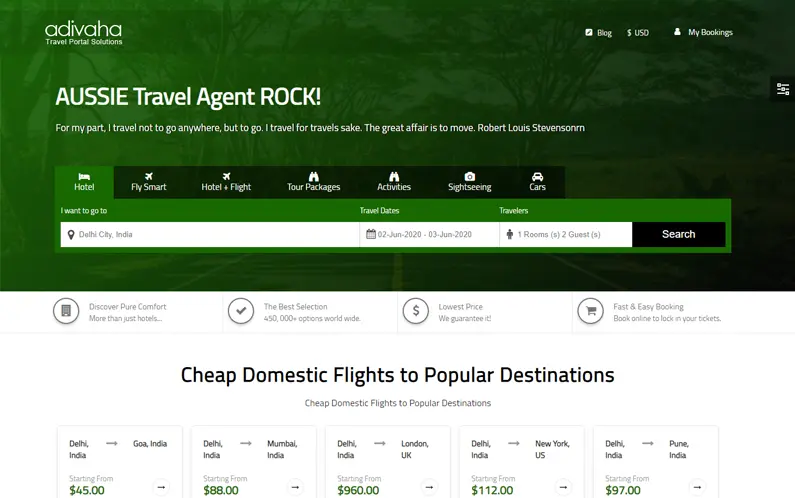Ready to go-LIVE travel solutions that helps your travel agency to sell a range of travel services pretty instantly. adivaha® travel solutions make sure you have no boundation over your imagination, you can do everything online, without the need for any technical knowledge or design skills. Easy Backoffice, extensive reporting with integrated Funds Management System. Upload funds easily and instantly through Netbanking, Debit Card, Credit Card. The best part is, we do offer customizations in case you believe it will boost your business!
B2C White Label Travel Portal for Build a Booking Platform
With this guide, you can create an amazing B2C white label travel portal and customize it according to your needs. Find out how to start your journey with these helpful tips!
Creating a robust B2C White Label Portal presents an exhilarating opportunity for innovation. This guide serves as your roadmap to success, equipping you with strategies to harness existing tools, craft stunning designs, and utilize data analytics for personalized customer experiences. By integrating these elements, you can enhance engagement, foster brand loyalty, and deliver exceptional service, paving the way for a thriving online presence in the competitive travel market.
Analyze Your Tour and Travel Business Needs.
Before embarking on the journey of building a travel portal, it’s crucial to thoroughly understand the specific needs of your tour and travel theme business. Start by evaluating the types of tours and services you provide, and explore ways to enhance their appeal to potential customers. Leverage customer data and analytics to personalize travel experiences, creating memorable journeys that encourage repeat business and foster loyalty.
Clearly define your business objectives, whether it’s boosting revenue, expanding your customer base, enhancing satisfaction, or minimizing costs. Your website should reflect these goals. Gain insights into your customers’ preferences, including favored destinations, tour types, and budget limits, allowing you to tailor offerings to meet their needs effectively.
Additionally, develop a comprehensive marketing strategy to elevate your brand presence, utilizing channels like social media, email campaigns, and partnerships with related businesses. Assess your financial requirements for marketing, technology, staffing, and operational costs to create an effective budget. Lastly, ensure you understand the compliance landscape for your travel business, including necessary licensing, permits, insurance, and legal regulations. This thorough preparation will set a solid foundation for your portal’s success and growth in the competitive travel industry.
 Creating Your Own B2C White Label Travel Portal
Creating Your Own B2C White Label Travel PortalDesign a Scaleable Architecture for Your Core Features and Platforms
When developing your ideal best white label travel portal, prioritizing a scalable architecture is essential for long-term success. Begin by outlining architectural goals such as performance, availability, scalability, security, and cost-effectiveness. The technologies you choose play a pivotal role in achieving a robust and scalable framework. Opt for solutions that allow for horizontal scaling, enabling the system to accommodate increased traffic by adding resources like servers without compromising performance.
Implementing caching strategies is vital for enhancing efficiency; by storing frequently accessed data in memory, you can alleviate the strain on your database. Caching can be applied at multiple levels, including the application layer, web server layer, and database layer.
As your business gains traction, the ability to integrate additional features, platforms, and services seamlessly is crucial. A resilient architecture should be built to withstand the failure of individual components through redundancy, failover mechanisms, and effective disaster recovery plans. Consider adopting microservices and service-oriented architecture (SOA) to create a modular, secure infrastructure that facilitates the rapid development of new travel technology services while safeguarding existing functionalities. Focus on ensuring that new integrations can be incorporated smoothly, maintaining system stability without compromising on the necessary resources and expertise.
Integrate Advanced Features
An effective B2C and B2B white label travel portal must not only offer a diverse range of options but also enhance user experience through advanced features. Integrating these capabilities requires a systematic approach that begins with identifying essential features such as machine learning, artificial intelligence, natural language processing, and computer vision. Once identified, assess the feasibility of incorporating these technologies and choose suitable tools, whether utilizing open-source libraries, travel APIs, or third-party services that provide the desired functionalities.
After integrating these advanced features, rigorous testing is essential to validate their performance. This includes both functional and non-functional testing to ensure the features operate as intended without degrading the application’s overall performance. Additionally, implementing loyalty programs and cash-back incentives can significantly boost user engagement and retention over time.
Ongoing monitoring of the integrated features is vital for identifying issues and optimizing performance. This involves collecting and analyzing metrics, logging data, and soliciting user feedback. By continuously refining these advanced features based on insights gathered from users, you can enhance the portal's effectiveness, ensuring it meets the evolving needs of your customers and maintains a competitive edge in the travel industry.
Select Advanced Technologies and APIs to Enhance User Experience
To ensure your white label portal delivers an exceptional customer experience, choosing the right technologies and APIs is crucial. Key features like booking verification, payment gateways, airline ticket management systems, loyalty programs, and caching mechanisms should be carefully considered during the setup of your B2C white-label portal. Leveraging AI (Artificial Intelligence) and ML (Machine Learning) can significantly enhance user personalization and create more intuitive interactions. For instance, AI-driven chatbots can offer tailored recommendations and responses based on a user's previous behaviors and preferences.
Integrating various APIs is essential for creating a unified user experience. For example, implementing a payment gateway API can facilitate a seamless checkout process, ensuring users can complete transactions smoothly. Additionally, Natural Language Processing (NLP) technologies can foster more natural and conversational interactions, allowing users to engage with voice assistants or chatbots effectively.
By ensuring that end users have a consistent experience across different devices and platforms, you can minimize interruptions during transactions and enhance overall satisfaction. This strategic combination of advanced features and seamless integrations will not only improve user engagement but also strengthen customer loyalty, positioning your travel portal as a leader in the competitive travel market.
Explore Open-Source and Licensing Options for Your Portal
When launching your B2C white label portal, it's essential to carefully assess the variety of open-source and licensing options available. Depending on your business model, you can select from numerous free or paid solutions offered by various vendors. A detailed evaluation of each option is vital, as certain features may specifically align with your operational requirements. Widely-used open-source frameworks such as Drupal, Joomla, WordPress, and Magento offer solid foundations for constructing customizable travel portals.
While investigating open-source software, pay attention to the level of community support associated with each option. Established projects typically have active communities of contributors and users, providing a wealth of resources, documentation, and troubleshooting assistance. Additionally, the type of licensing can significantly influence how travel agency software is distributed. Open-source licenses like the GNU General Public License (GPL) and MIT License permit free modification and sharing of software, whereas commercial and proprietary licenses may require payment and impose restrictions on customization.
By carefully choosing your technology stack and understanding the licensing landscape, you can create a travel portal that meets your current needs while positioning your business for future growth. This proactive strategy ensures that your portal remains flexible and responsive to the evolving demands of the travel industry.
Keep Refreshing your customers - Who doesn't want his site to stand out from crowd? adivaha® gives you multiple options for home pages, headers, colors etc. Which can easily be managed from admin via shortcodes and settings. The theme supports almost all the big players in this market ie, WEGO, Travelpayouts, Agoda, Booking, Expedia etc.












